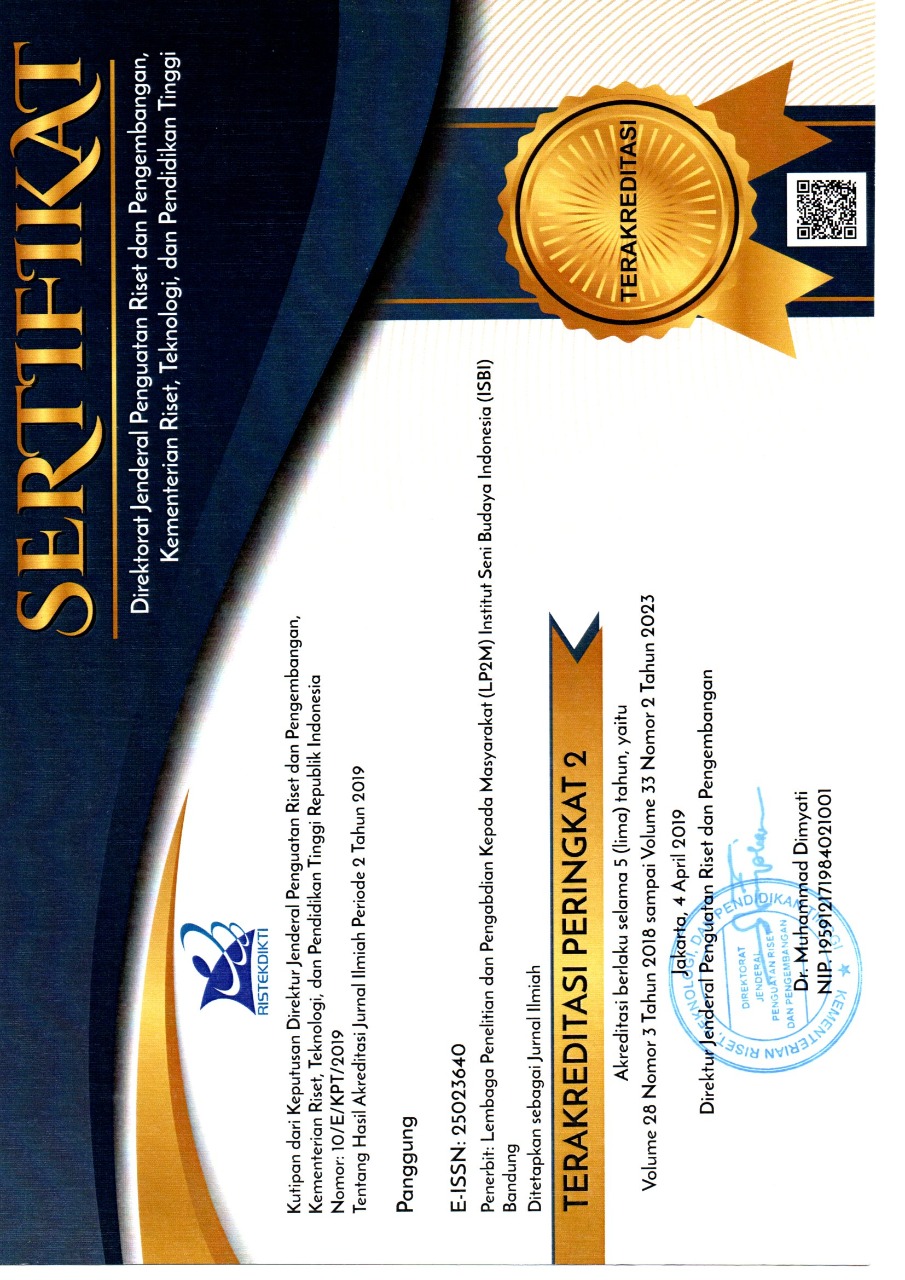Gastronomi dalam Cerita Rakyat Ainu Jepang
Abstract
ABSTRACT
This article analyzes the gastronomic aspects of the Ainu folklore in Japan. Gastronomic aspects examined
include how Ainu folklore narrates how they collect and cook food materials, how they consume, and
what cultural values are attached to both the process of food production and consumption. The study
applied library research and the object of analysis were selectively chosen from Ainu Mukashi Banashis
book: Hitotsubu no Satchiporo (2012), an anthology of Ainu folklore edited by Kayano Shigeru. The
stories chosen analyzed by the literary anthropology theory. The results show that the Ainu folklore
contains narratives about how people collect food, cook, and consume them. The study of the gastronomic
narratives of Ainu folklore presents a novelty that folklore not only contains a moral message for character
formation but is also a medium for preserving and continuing food and culinary culture across time and
generations.
Keywords: Ainu folktale, literary gastronomy, traditional food of Ainu Japan
ABSTRAK
Artikel ini menganalisis aspek gastronomi dari cerita rakyat Ainu Jepang. Aspek gastronomi
yang dikaji meliputi bagaimana cerita rakyat Ainu menceritakan cara mereka mengumpulkan
dan memasak bahan makanan, bagaimana mereka mengonsumsi, dan nilai-nilai budaya apa
yang melekat pada proses produksi dan konsumsi makanan. Penelitian dilakukan dengan riset
perpustakaan dan objek kajian dipilih secara selektif dari buku Ainu Mukashi Banashi: Hitotsubu
no Satchiporo (2012), sebuah antologi cerita rakyat Ainu dengan editor Kayano Shigeru. Data
dianalisis dengan teori antropologi sastra. Hasil penelitian menunjukkan bahwa cerita rakyat
Ainu mengandung narasi tentang cara masyarakat mengumpulkan bahan makanan, memasak,
dan mengkonsumsinya. Studi tentang narasi gastronomi cerita rakyat Ainu menyajikan hal
baru bahwa cerita rakyat tidak saja mengandung pesan moral untuk pembentukan karakter
tetapi juga menjadi media untuk melestarikan dan meneruskan budaya makanan dan kuliner
lintas waktu dan generasi.
Kata Kunci: cerita rakyat Ainu, gastronomi sastra, makanan tradisional Ainu Jepang
Full Text:
PDF DOWNLOADReferences
Daftar Pustaka
Barrre, C., Bonnard, Q., & Chossat, V. (2012).
Food, gastronomy and cultural
commons. In E. Bertacchini, G. Bravo,
M. Marrelli andW. Santagata (Eds.),
Cultural commons: A new perspective
on the production and evolution of
cultures (hlm. 129150). Cheltenham,
UK: Edward Elgar.
Bestor, Theodore C. and Victoria Lyon
Besto. 2011. Cuisine and Identity in
Contemporary Japan. Education About
Asia Volume, 16 (3), 1318.
Bramantio, Bramantio. 2013. Sastra Dan
Kuliner: Evolusi Gastronomi Ke
Gastrosofi Dalam Tiga Cerpen
Indonesia, Jentera, 2 (1), 4255.
Cheung, S.C.H. 2003. Ainu Culture in
Transition. Futures 35, 951959.
Danandjaja, Djames. 1995. A Comparative
Study of Japanese and Indonesian
Folklores, Southeast Asian Studies, 33
(3), 202214.
Danandjaja, James. 1986. Folklor Indonesia,
Ilmu Gosip, Dongeng, dan lain-lain.
Jakarta: Pustaka Utama Grafiti.
Endraswara, Suwardi. 2018. Metode Penelitian
Gastronomi Sastra. Yogyakarta:
Textium.
HATA. 2017. Living Together with Forest.
http://hokkaido-adventuretravel.com/
program/program-title-007/.
Hayashi, Yoshishige. 1970. Ainu Food.
Hokudai Economic Papers, 2, 115.
Hjalager, Anne-Mette dan Greg Richards
(eds.) 2002. Tourism and Gastronomy.
London: Routedge.
Kayano, Shigeru. 2012. Ainu Mukashi Banashi:
Hito Tsubu no Satchiporo. Tokyo:
Heibonsha.
Kayano, Shigeru. 2004. The Ainu: A Story of
Japans Original People. Tokyo: Tuttle
Publishing.
Kayano, Shigeru. 2005. Kayano Shigeru:
Ainu no Sato Nibutani ni Ikite. Tokyo:
Nihontoshosentaa.
Kurashino. 2018. Ainu Ryouri to wa? Sono
Skoku Bunka to Tokyo de Ainu Ryouri
ga Taberareru Omise o Goshoukai!
https://kurashi-no.jp/I0016230.
Lewallen, Ann-Elise. 2014. The Gender of
Cloth: Ainu Woman and Cultural
Revitalization dalam Hudson, Mark
J., Ann-Elise Lewallen, dan Mark K.
Watson (ed.) Beyond Ainu Studies.
Honolulu: University of HawaiI Press,
hlm. 171184.
Molina, Mara de Miguel, Blanca de Miguel
Molina, Virginia Santamarina Campos
dan Mara del Val Segarra Oa. (2016).
Intangible Heritage and Gastronomy:
The Impact of UNESCO Gastronomy
Elements. Journal of Culinary Science
& Technology, 14 (4), 293310.
Pialang, Yasraf Amir dan Rully Darmawan.
Kreativitas Desain Kuliner dan
Sistem Inovasi Lokal. Panggung 24 (3),
294.
Refsing, Kirsten. 2014. From Collecting Words
to Writing Grammars: A Brief History
of Ainu Linguistics dalam Hudson,
Mark J., Ann-Elise Lewallen, dan Mark
K. Watson (ed.) Beyond Ainu Studies.
Honolulu: University of HawaiI Press,
hlm. 185199.
Setiawan, Deni, Timbul Haryono, dan M. Agus
Burhan. 2014. Prinsip Estetika Pakaian
Cosplay Yogyakarta: Fantasi dan
Ekspresi Desain Masa Kini. Panggung,
(1), 3948.
Strong, Sarah M. 2009. The Most Revered of
Foxes: Knowledge of Animals and
Animal Power in an Ainu KamuiYukar.
Asian Ethnology, 68 (1), 2754.
Strong, Sarah M. 2011. Ainu Spirits Singing:
The Living World of Chiri Yukies Ainu
Shinyushu. Honolulu: University of
Hawaii Press.
Vecco, M. (2010). A definition of cultural
heritage: From the tangible to the
intangible. Journal of Cultural Heritage, 11 (3), 321324.
Watson, Mark K., Ann-Elize Lewallen, dan
Mark J. Hudson. (2014). Beyond
Ainu Studies An Introduction dalam
Hudson, Mark J, Ann-Elise Lewallen,
dan Mark K. Watson (ed.) Beyond
Ainu Studies. Honolulu: University of
HawaiI Press, hlm. 124.
DOI: http://dx.doi.org/10.26742/panggung.v30i2.1205
Refbacks
- There are currently no refbacks.
Statistik Pengunjung Jurnal Panggung
Jurnal ini terlisensi oleh Creative Commons Attribution-ShareAlike 4.0 International License.
Editor Office:
Lembaga Penelitian dan Pengabdian Kepada Masyarakat (LP2M)
Institut Seni Budaya Indonesia (ISBI) Bandung Gedung Rektorat Lantai 4
Jl. Buah Batu No. 212 Bandung 40116
Email: penerbitan@isbi.ac.id or redaksi.panggung@gmail.com
Phone: 022 7314982 Fax: +022 7303021













